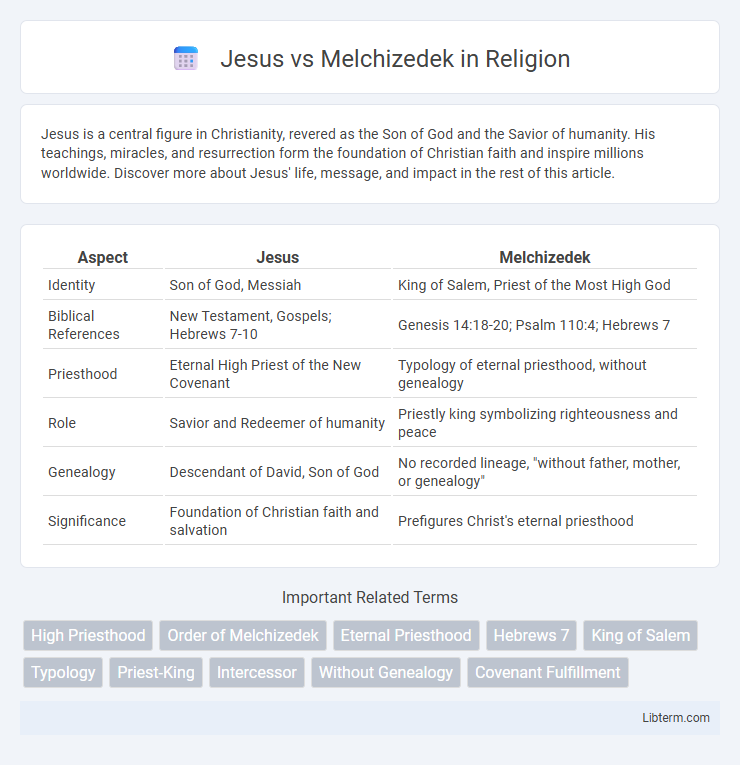Jesus is a central figure in Christianity, revered as the Son of God and the Savior of humanity. His teachings, miracles, and resurrection form the foundation of Christian faith and inspire millions worldwide. Discover more about Jesus' life, message, and impact in the rest of this article.
Table of Comparison
| Aspect | Jesus | Melchizedek |
|---|---|---|
| Identity | Son of God, Messiah | King of Salem, Priest of the Most High God |
| Biblical References | New Testament, Gospels; Hebrews 7-10 | Genesis 14:18-20; Psalm 110:4; Hebrews 7 |
| Priesthood | Eternal High Priest of the New Covenant | Typology of eternal priesthood, without genealogy |
| Role | Savior and Redeemer of humanity | Priestly king symbolizing righteousness and peace |
| Genealogy | Descendant of David, Son of God | No recorded lineage, "without father, mother, or genealogy" |
| Significance | Foundation of Christian faith and salvation | Prefigures Christ's eternal priesthood |
Introduction: Understanding Jesus and Melchizedek
Jesus and Melchizedek are central figures in biblical theology, each representing unique priestly roles with profound spiritual significance. Melchizedek, described as the king of Salem and priest of the Most High God, serves as a mysterious Old Testament type of the eternal priesthood. Jesus, identified in the New Testament as the high priest forever in the order of Melchizedek, fulfills and transcends this ancient priesthood through his eternal sacrifice and mediation.
Historical and Biblical Background
Jesus and Melchizedek share significant historical and biblical connections as Melchizedek, king of Salem and priest of the Most High God, appears in Genesis 14 as a mysterious figure whose priesthood predates the Levitical order. The Book of Hebrews emphasizes Jesus' high priesthood as being in the order of Melchizedek, highlighting an eternal and superior priesthood distinct from Aaronic lineage. This typology underscores Jesus' unique divine authority, blending royal and priestly roles that fulfill Old Testament prophecy and foreshadow the New Covenant.
Melchizedek: King and High Priest
Melchizedek, King of Salem and High Priest of the Most High God, serves as a unique biblical figure who prefigures Jesus Christ's eternal priesthood. His dual role as both king and priest symbolizes a perfect union of spiritual and earthly authority, which Jesus fulfills with greater power and permanence. Unlike the Levitical priests, Melchizedek's priesthood is without lineage or end, highlighting the timeless and superior nature of Christ's priesthood.
Jesus: The Eternal High Priest
Jesus, as the Eternal High Priest, surpasses Melchizedek by offering an everlasting priesthood that mediates a new covenant between God and humanity. Unlike Melchizedek, whose priesthood was temporary and symbolic, Jesus' sacrifice is perfect and eternal, providing continuous access to divine grace. His role affirms the fulfillment of Old Testament prophecy, establishing a permanent and heavenly intercession for believers.
The Order of Melchizedek Explained
The Order of Melchizedek is a unique priesthood mentioned in the Bible, chiefly in Hebrews 7, linking Melchizedek's eternal priesthood to Jesus Christ's divine role. Melchizedek, king of Salem and priest of the Most High God, symbolizes an everlasting priesthood that predates and surpasses the Levitical order. Jesus is described as a priest forever in the order of Melchizedek, highlighting his eternal intercession and perfect mediation between God and humanity.
Biblical Parallels: Jesus and Melchizedek
Jesus and Melchizedek share significant biblical parallels as both are described as eternal priests and kings, with Melchizedek being a type or foreshadowing of Christ's eternal priesthood in the Book of Hebrews (Hebrews 7:1-3). Melchizedek, king of Salem and priest of the Most High God, blesses Abraham, illustrating a priestly authority that surpasses the Levitical order, which parallels Jesus' eternal priesthood that mediates a new covenant (Psalm 110:4). The parallels emphasize Jesus' superior and eternal priesthood, establishing Him as a high priest according to the order of Melchizedek, which is without genealogy or death, unlike the Levitical priests.
Theological Significance in Christianity
Jesus and Melchizedek hold profound theological significance in Christianity as Melchizedek, a priest-king in Genesis, prefigures Christ's eternal priesthood described in Hebrews. Jesus is understood as the ultimate High Priest in the order of Melchizedek, combining both kingly and priestly roles, surpassing the Levitical priesthood. This connection emphasizes Jesus' unique mediatory role and the establishment of a new, everlasting covenant between God and humanity.
Jesus’ Superiority over Melchizedek
Jesus' superiority over Melchizedek is established through His eternal priesthood as described in Hebrews 7, where He remains a high priest forever, unlike Melchizedek whose priesthood was temporary and without recorded lineage. The eternal nature of Jesus' priesthood surpasses Melchizedek's because He intercedes on behalf of humanity once and for all, providing a perfect and final sacrifice. This supremacy underscores Jesus as the ultimate mediator between God and man, fulfilling and exceeding the symbolic role Melchizedek held.
Implications for Modern Faith
Jesus and Melchizedek share a unique priesthood that transcends the traditional Levitical order, offering a timeless model for spiritual authority and intercession. The depiction of Jesus as a high priest "after the order of Melchizedek" in Hebrews emphasizes his eternal, unchangeable priesthood, providing believers with direct access to God and a new covenant based on grace rather than law. This theological connection reinforces themes of divine kingship and priesthood, encouraging modern faith communities to embrace a deeper understanding of salvation, worship, and spiritual leadership beyond Old Testament structures.
Conclusion: The Lasting Legacy of Jesus and Melchizedek
Jesus and Melchizedek share a profound spiritual significance as eternal priestly figures, with Melchizedek serving as a mysterious Old Testament archetype and Jesus as the fulfillment of his priesthood in the New Testament. The lasting legacy of Jesus transcends Melchizedek's typology by establishing a new covenant through his sacrificial role, providing believers with direct access to God and eternal salvation. This unique priesthood of Jesus, described in Hebrews 7, continues to influence Christian theology, worship, and the understanding of divine mediation across centuries.
Jesus Infographic

 libterm.com
libterm.com